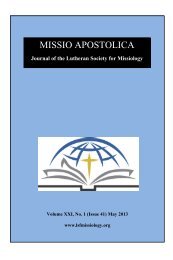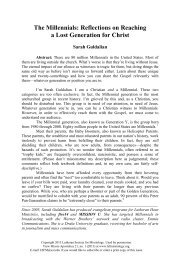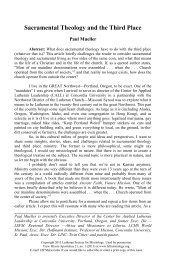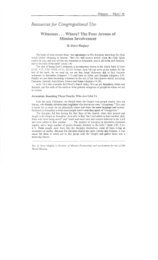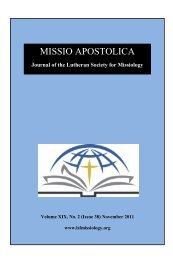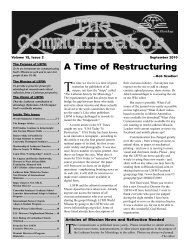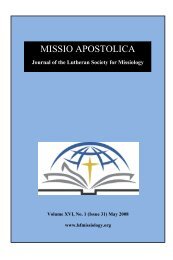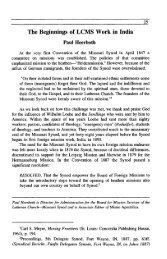Reflections of a New Missionary - Lutheran Society for Missiology
Reflections of a New Missionary - Lutheran Society for Missiology
Reflections of a New Missionary - Lutheran Society for Missiology
You also want an ePaper? Increase the reach of your titles
YUMPU automatically turns print PDFs into web optimized ePapers that Google loves.
and only secondarily a socio-psychological reality, its structure and life must fust be<br />
determined theologically.<br />
The ordering <strong>of</strong> the articles in the Augsburg Confession is very instructive in this<br />
regard. Following Article IV, on Justification, which the Apology calls the "main article<br />
<strong>of</strong> the entire Christian teaching" (and which Luther in the Smalcald Articles termed "the<br />
first, fundamental article,") flows the article on the means <strong>of</strong> grace and worship. It was<br />
<strong>for</strong> the sake <strong>of</strong> justification, "so that we may obtain such faith," that God instituted the<br />
ministry <strong>of</strong> preaching the Gospel and administering the Sacraments. Then, following the<br />
article on the new obedience (AC VI), the Augsburg Confession defines the church as<br />
"the assembly <strong>of</strong> all believers in which the Gospel is preached purely and the holy<br />
sacraments are administered according to the Gospel."<br />
The Augustana, there<strong>for</strong>e, begins its exposition <strong>of</strong> the church with the doctrine <strong>of</strong><br />
justification and the means <strong>of</strong> grace. According to the Augsburg Confession the church is<br />
believers in Christ, to be sure. But it is not only that. (TO say only that is to speak only<br />
half the truth, and the lesser half, at that.) The church is believers who are gathered<br />
around the Gospel and Sacraments. To speak <strong>of</strong> the church only as believers is to speak<br />
in terms <strong>of</strong> the result. But what if we think "out from the center," with the Augustana, in<br />
terms, not <strong>of</strong> the result, that is, believers, but <strong>of</strong> the cause, that is, the doctrine <strong>of</strong><br />
just~fication How might our understanding <strong>of</strong> church change and how might that<br />
changed understanding lead to an understanding <strong>of</strong> worship that has a distinctively<br />
<strong>Lutheran</strong> look (that is, Gospel-centered)<br />
A Gospel-Centered Church<br />
An ecclesiology with the Gospel at its heart would understand itself primarily in<br />
reference to the Means <strong>of</strong> Grace. The things that most define the church are its marks, the<br />
gifts <strong>of</strong> Christ around which Christ gathers his holy people: Baptism (Mt. 28:19; 1 Pet.<br />
3:21), Holy Absolution (Jn. 20:23), the Lord's Supper (Mt. 26:28), and the Word<br />
proclaimed (Jn. 17:20; Rom. 10:14-15). These are the things that give definition to the<br />
church. For it is in, with, and under these visible and audible elements that the Christ<br />
whose church it is has promised to be salvificly present <strong>for</strong> us. To these he has attached<br />
his promises <strong>of</strong> <strong>for</strong>giveness. Through them he bestows his Holy Spirit. None <strong>of</strong> this is<br />
possible wlthout the Means <strong>of</strong> Grace. They are central. They are defming.<br />
"Where the Gospel is purely taught and the Sacraments rightly adrmnistered," (AC<br />
VII) there is the church. If you don't have these, you cannot be sure that you have the<br />
church. This principle does not allow <strong>for</strong> a purely socio-psychological understanding <strong>of</strong><br />
the church. Kor does it permit us to treat the Means <strong>of</strong> Grace as merely the<br />
presuppositions, or as a preamble to a discussion <strong>of</strong> the church. Christ has placed His<br />
gifts, the means through which He by his Spirit bestows his grace, at the center. This is<br />
what makes us a sacramental and <strong>Lutheran</strong> church. Only by maintaining this centrality<br />
may we continue to be <strong>Lutheran</strong>, i.e., sacramental, today.<br />
theolog~cally m~staken, not, as is so <strong>of</strong>ten asserted, from some sort <strong>of</strong> fear <strong>of</strong> it. I am not afraid <strong>of</strong> the model. I<br />
simply believe it is <strong>of</strong>f-center in its approach to what the church most fundamentally is and what it is to be<br />
about in the world.




